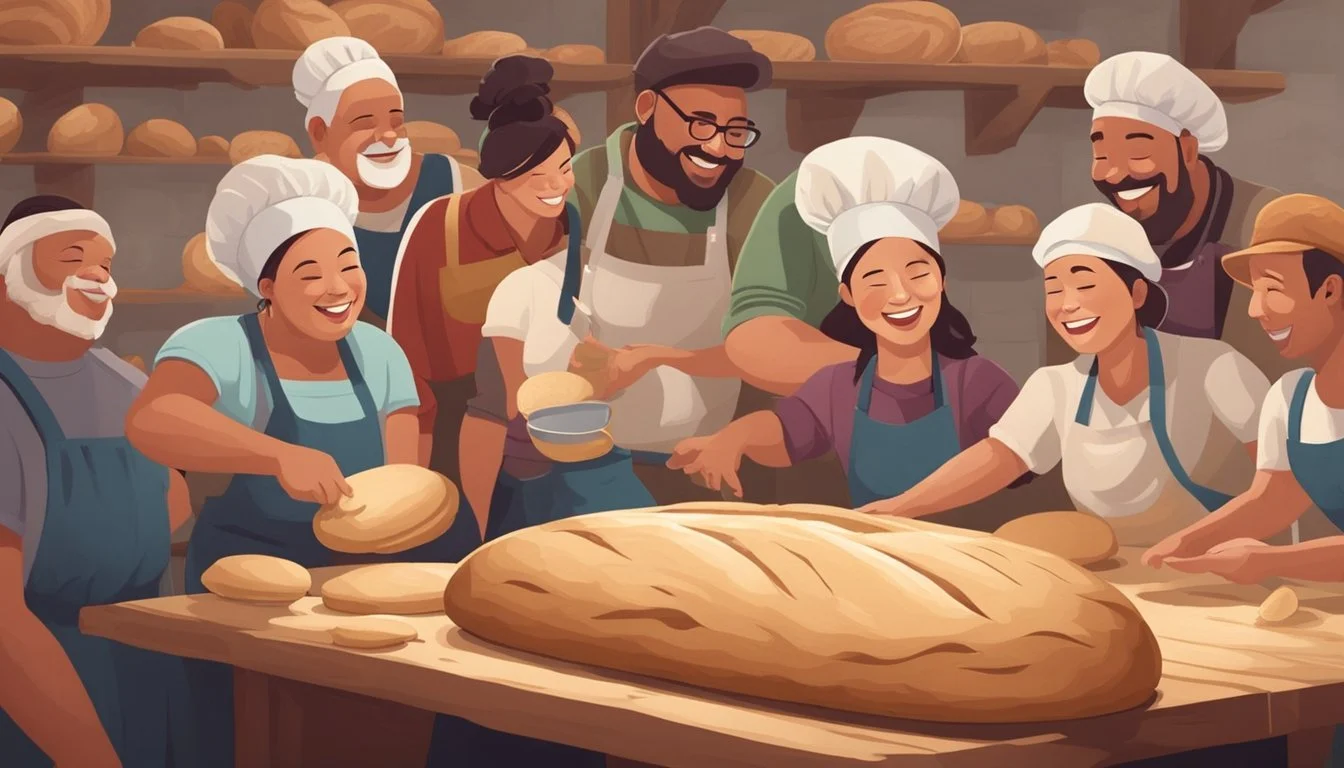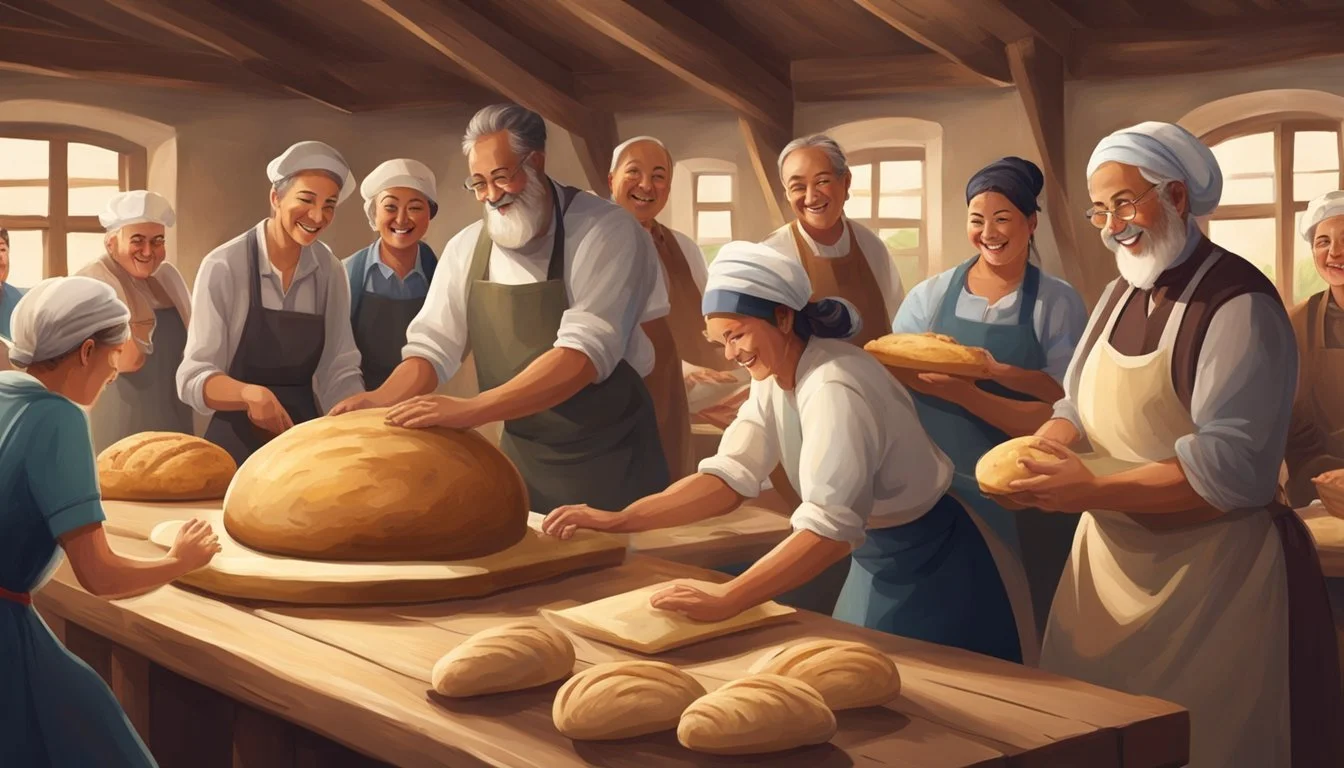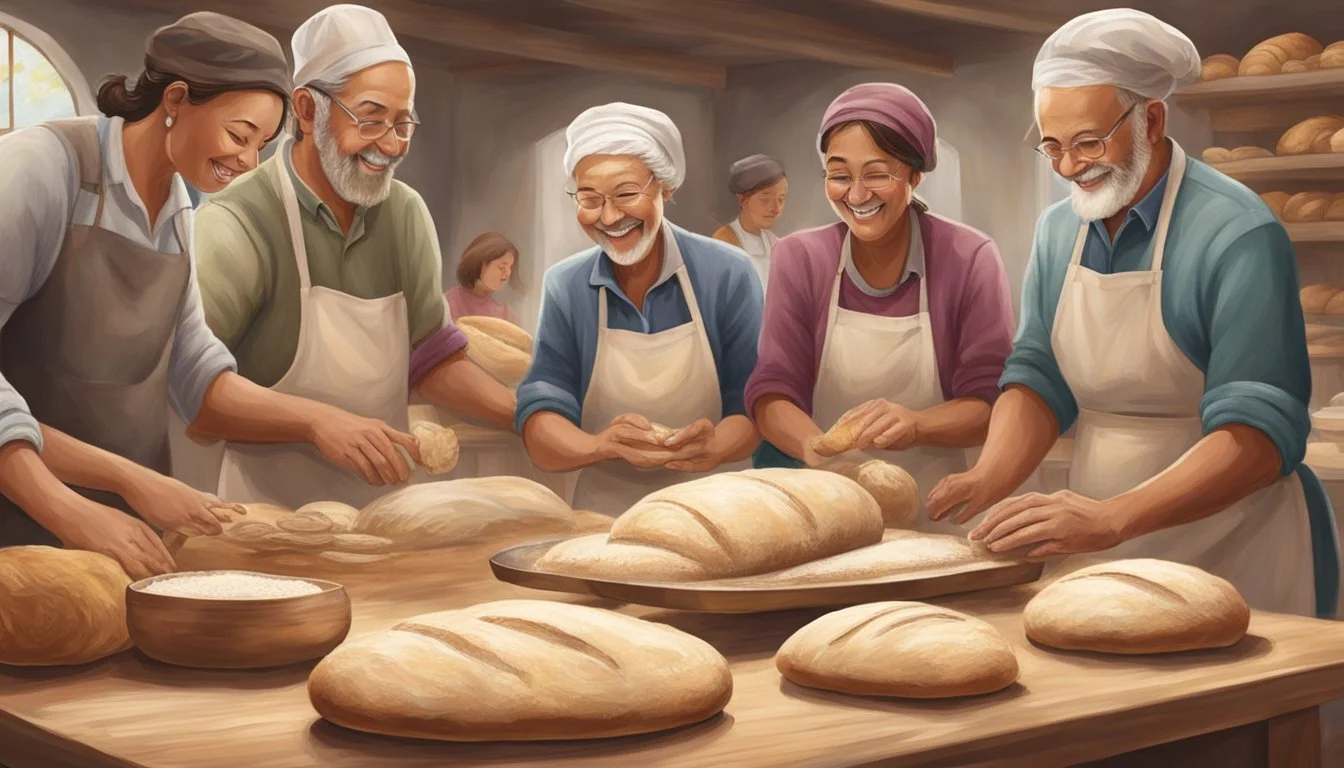Celebrating Sourdough
Embracing the Art of Bread Making Together
Sourdough has long been more than just a method of bread (What wine goes well with bread?) making; it is a craft that brings together culinary enthusiasts and communities. The time-honored tradition of sourdough baking, which can trace its roots back to ancient civilizations, continues to thrive in contemporary settings. Notably, events like the Sourdough Bread Contest at Dewey Memorial Hall encapsulate the communal spirit inherent in the art of sourdough bread making. These gatherings serve not only as a platform for bakers to showcase their skills but also offer a space for community members to celebrate their shared appreciation for this artisanal form of bread.
At these events, participants immerse themselves in a rich sensory experience, with the aroma of freshly baked bread in the air and an array of local cheeses, wines, and beers that complement the taste profiles of sourdough. The Dewey Hall Sourdough Bread Contest stands out as an illustrative example, turning bread making into an interactive and joyful communal gathering. Here, both bakers and spectators converge to appreciate the complexities of sourdough bread, from its unique tangy flavor to its distinct chewy texture, and the nuanced techniques that go into creating each loaf.
These community events highlight the growing trend of valuing artisanal food processes and the social interactions they foster. The sourdough contests not only strengthen the bonds among residents but also promote local produce, reinforcing the significance of supporting regional farmers and producers. Through such celebrations, the essence of sourdough extends beyond the crust and crumb; it weaves into the social fabric, solidifying its place as a cultural staple and a beloved community event.
History and Tradition of Sourdough
Sourdough bread's origins date back to ancient civilizations, with evidence suggesting it was first made around 1500 BC in Ancient Egypt. It likely emerged by chance when a mixture of flour and water fermented with wild yeast in the environment, leading to natural leavening—a significant turning point in the history of bread-making.
Through the Middle Ages, the tradition of sourdough bread-making evolved. Bakers passed down sourdough starters—a mixture of flour, water, and wild yeast—that would ferment and rise the dough. These starters were crucial, as commercial yeast was not yet available. Sourdough starters became family heirlooms, cherished for their unique flavors and shared during times of scarcity.
In more recent history, San Francisco became synonymous with sourdough during the California Gold Rush era. Miners, also known as "sourdoughs," relied on the bread's long shelf life and robust flavor. The city's unique climate fostered distinct sourdough starters, rich in local bacteria, contributing to the legend of “traditional sourdough.”
Key Traditions:
The sharing of sourdough starters in communities
Techniques varying by region, influenced by local environments
The maintenance and care of starters as an ongoing, multi-generational practice
Today's sourdough practices retain this heritage, combining ancient methods with modern culinary techniques. Bakers respect the time-honored craft by nurturing starters, selecting quality ingredients, and embracing the slow fermentation that characterizes traditional sourdough bread. This commitment to tradition makes each loaf a celebration of shared history and communal spirit.
The Science of Sourdough
Sourdough bread is not just a delectable delight; it is the outcome of a scientific symphony of microbial activity and fermentation. The following subsections will explore the crucial role of yeast in leavening, the notable health benefits of sourdough, and the differences between using a sourdough starter and commercial yeast.
Understanding Yeast and Leavening
Yeast is a microscopic fungus that, when combined with flour and water, initiates the leavening process crucial to sourdough bread. The sourdough culture, teeming with wild yeasts and bacteria, ferments the dough and produces carbon dioxide. This gas gets trapped within the dough, causing it to rise and result in the bread's characteristic airy texture. The ambient temperature can influence the activity of these microbes; warmer conditions accelerate yeast activity and produce more pronounced sour flavors, while cooler environments might yield a milder taste with subtle fruity notes.
Health Benefits of Sourdough
The long fermentation period of sourdough not only contributes to its unique flavor but also enhances its health benefits. The lactic acid bacteria present in the sourdough starter produces organic acids during fermentation, which can help make nutrients more available and potentially improve digestion. Additionally, the acidification of the dough reduces the bread's glycemic index, while prebiotics help support gut health.
Sourdough Starter vs. Commercial Yeast
When comparing a sourdough starter to commercial yeast, several distinct differences become evident. A sourdough starter is a mixture of flour and water that has been allowed to naturally ferment, capturing wild yeasts and bacteria from the environment. This leads to a complex flavor profile and variable texture.
In contrast, commercial yeast typically refers to single strains of Saccharomyces cerevisiae that are cultivated for uniformity, offering a consistent and quick rise time. While commercial yeast can expedite the bread-making process, it lacks the depth of flavor and unique health properties offered by a natural sourdough culture.
Sourdough Bread Making
Sourdough bread making is a craft that connects people with a tradition spanning across centuries. Workshops and tips for home bakers ensure that the art thrives in modern kitchens.
The Traditional Method
The traditional method of creating sourdough bread is a time-honored process that starts with a simple mixture of flour and water. This blend, known as the starter, is left to ferment, capturing wild yeast from the environment which allows the bread to rise without the use of commercial yeast. Temperature and humidity play crucial roles in the fermentation process, reflecting the environment's influence on the character of the sourdough. Home bakers often find that this method not only produces a distinctive tangy flavor but also fosters a profound connection with the basics of bread making.
Sourdough Workshops
Many communities offer sourdough workshops, which range from in-person sessions to virtual sourdough bread workshops conducted over platforms like Zoom. During these workshops, participants learn about the subtleties of handling the dough, maintaining the starter, and the importance of precise measurements, all under the guidance of experienced bakers. The interactive nature of such workshops is crucial, as they provide immediate feedback and foster a community around the shared passion for baking sourdough bread.
Tips for Home Bakers
Home bakers looking to perfect their sourdough loaves can benefit from a few expert tips:
Consistency: Stick to a feeding schedule for your starter to maintain its health.
Patience: Allow the dough to ferment properly, which can enhance flavor and texture.
Adaptability: Be prepared to adjust water or flour amounts as needed since the dough's consistency can be affected by various factors like humidity and flour type.
By incorporating these practices, home bakers can consistently produce high-quality, flavorful sourdough bread.
Culinary Events and Competitions
Culinary events often combine competition with celebration, creating opportunities for local home bakers to showcase their skills and for spectators to enjoy a variety of tastings. These events provide a comprehensive culinary experience, focusing not just on bread but cheese and wine as well.
Community Event Overview
Community culinary events serve as a platform to celebrate local culture and gastronomy. They often feature a range of activities that engage attendees, from baking competitions to tastings. Such gatherings are pivotal in promoting local artisans and fostering a sense of community among participants.
Bread-Baking Competition
At the heart of these events is the bread-baking competition, where bakers submit their best sourdough loaves for judging. Judges evaluate the bread based on criteria such as texture, taste, and appearance. Prizes often motivate participants to bring their A-game, while the opportunity to win freshly baked sourdough bread and other prizes adds excitement for the spectators. Bakers are usually required to submit two loaves: one for tasting and judging, and another for a raffle, with proceeds often benefiting the hosting venue.
Registration Fee: $15 for bakers
Admission: $30 for spectators
Cheese and Wine Pairing
Complementing the bread-baking, cheese and wine pairings offer a luxuriant taste experience. Artisanal cheese selections paired with fine wine elevate the event, indulging the taste buds of every bread lover. These pairings are curated to enhance both the cheese and the bread showcased during the event. Attendees not only get to savor these pairings but also gain insights into the art of food pairing, making the event educational as well as enjoyable.
Event Highlights at Dewey Hall
Dewey Hall, a historical cornerstone of Sheffield, Massachusetts, unfolds its doors for a sourdough bread-making event that blends culinary craftsmanship with community spirit.
Event Organizers
Behind the Sourdough Bread Workshop at Dewey Hall are prominent community figures and organizations. Jean-Francois Bizalion of Bizalion's Fine Foods and Richard Bourdon from Berkshire Mountain Bakery are key figures in the bread-making community. Hosting the event, Dewey Memorial Hall is supported by the Sheffield Friendly Union. The event is crafted for attendees to learn, socialize, and indulge in the art of sourdough making.
Entertainment and Activities
The event offers not just learning opportunities but also entertainment. Live music is courtesy of the Michael Junkins Duo, setting an engaging atmosphere. Attendees participate in sampling an array of sourdough bread, reveling in the aromas and flavors brought together by local bakers. Additionally, there is a chance to win freshly baked sourdough and other prizes through a raffle meant to benefit Dewey Hall.
The Sourdough Bread Workshop at Dewey Hall
As a central highlight, the workshop underscores the intricacies of sourdough bread-making. Experts such as Evelyn Battaglia, a seasoned food writer and cookbook editor, along with Sherri Gorelick and Sarah Reynolds North, both from The Berkshire Edge's special projects editorial team, provide insights into the baking process. Pre-registration is encouraged, details of which can be found at www.deweyhall.org. Under their tutelage, enthusiasts and neophytes alike delve into the fermentation process of sourdough, a tradition as storied as Dewey Hall itself, now revitalized through "Found Bread" workshops.
Complementary Foods and Beverages
When planning a community event centered around sourdough bread, the inclusion of complementary foods and beverages enhances the overall experience. Guests can enjoy a variety of pairings that bring out the flavors of freshly baked sourdough bread.
Bread, Cheese, and Wine
Freshly baked sourdough bread is a versatile canvas for a range of cheeses, from soft to hard, mild to sharp. A cheese board featuring a selection of local and artisanal cheeses allows guests to sample different textures and flavor profiles. Pairing sourdough with wine is a classic choice, with white wines complementing creamy cheeses and robust reds standing up to aged varieties.
Non-Alcoholic Alternatives
For those preferring non-alcoholic beverages, sparkling water and craft sodas provide a refreshing accompaniment to sourdough bread and cheese. Offering a selection of herbal teas or freshly brewed coffee can cater to a variety of preferences, ensuring all guests have options to enjoy alongside their bread and cheese samples.
Recipes for Sourdough Pairings
Attendees may appreciate a small booklet or card with recipes for sourdough pairings that they can take home. These can include suggestions for constructing the perfect cheese board, ideas for seasonal spreads, and tips on choosing beverages, both alcoholic like beer and non-alcoholic, to complement the sourness and complexity of the bread. Providing a raffle with gift baskets of these pairings can add excitement to the event.
Participation Details
The Sourdough Bread Contest is an annual event that brings together the community by celebrating the art of sourdough bread-making. Individuals can showcase their baking skills, while spectators can enjoy the festive atmosphere along with cheese, wine, and beer.
How to Enter the Competition
Contestants interested in entering the competition are required to pay a registration fee of $15. To participate as a baker, one needs to follow these steps:
Pre-register: Bakers must pre-register their participation to secure a spot in the contest.
Recipe Submission: Each contestant should be prepared to provide details of their sourdough recipe upon request.
Contact: For registration and further information, contestants should contact Dewey Memorial Hall at 91 Main Street, Sheffield, MA.
Note: It is recommended for contestants to contact Dewey Memorial Hall well in advance of the event.
Spectator Information
Spectators are welcomed to be part of the sourdough bread contest. The key details for spectators are as follows:
Admission Fee: $30 per person. (Children 12 and under are admitted free, but reservations are requested.)
Reservations: Although not mandatory for adults, reservations are encouraged to ensure adequate space and provisions for all attendees.
Spectators should be aware that proof of vaccination might be required and should check for the most current health and safety requirements prior to attendance.
Cultural and Community Impact
Sourdough bread-making brings people together, transcending mere food preparation to become a cultural touchstone and an opportunity for community engagement and education.
Connecting Through Baking
Community events centered on sourdough bread-making help form bonds among individuals through shared culture and traditions. Contestants gather at these events, such as the Sourdough Bread Contest in Sheffield, MA, presenting their full-size loaves to be assessed by both peers and judges. Not only do bakers display their skills, but attendees also enjoy a sensory feast of flavors, textures, and aromas, transforming the event into a collective experience.
Educational Workshops
Such gatherings often include workshops aimed at educating attendees about sourdough and its unique leavening agents. Participants learn the process from seasoned bread bakers, gaining insights into cultivating starters and techniques for creating perfect crusts and crumbs. Moreover, the competitions are augmented by activities like tasting/judging sessions and the chance to see loaves being raffled off, all while an emcee maintains the flow of the event, often to the backdrop of live music, enhancing the festive atmosphere.
Promotion and Media
Effective promotion is key to the success of community events celebrating sourdough bread making. Creating buzz and awareness about the event involves a combination of compelling marketing materials and a robust online presence, including virtual events.
Marketing Materials
A successful campaign benefits greatly from the expertise of a graphic designer. For example, Perry Grebin, a skilled artist with experience in both screen and stage design, can craft visually appealing flyers and posters. These materials are integral in attracting local interest and are often displayed in popular spots like Autobahn, a trendy venue that supports community events, and Dare Bottleshop, known for its curated beverage selections.
Marketing materials could include:
Flyers: Distributed in community hotspots and local businesses.
Posters: Featuring eye-catching designs by graphic designers such as Perry Grebin.
Banners: Displayed at strategic outdoor locations to maximize visibility.
Online Presence and Virtual Events
Maintaining an online presence is crucial for community engagement. A dedicated phone line, such as (413) 413 1322, managed by Sarah North or Travis Brecher, can serve for inquiries, while a social media campaign spearheaded by an artist like Katy Sparks, who appreciates the edible natural world, might focus on organic reach.
Key online strategies include:
Social Media: Updates and live streaming events to showcase the bread-making process, led by Katy Sparks.
Website: A central hub for event information and registrations, including gluten-free baking options from Creature Breads by Katy Sparks.
Virtual Events: Hosted webinars or baking sessions with experts like Sarah North, who can demystify the art of sourdough bread making for enthusiasts.






